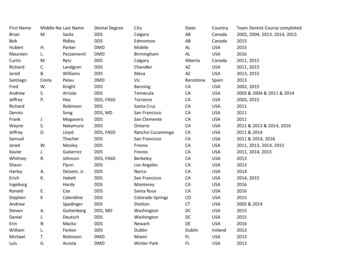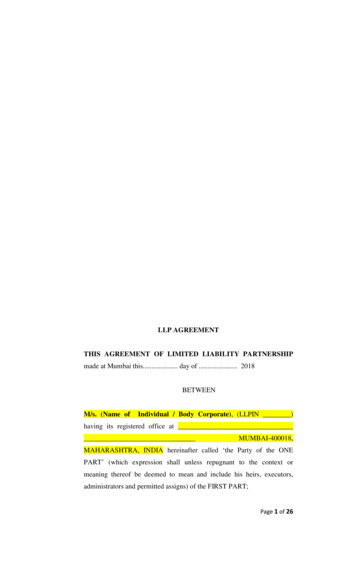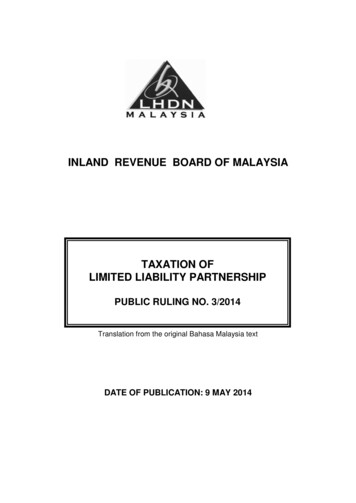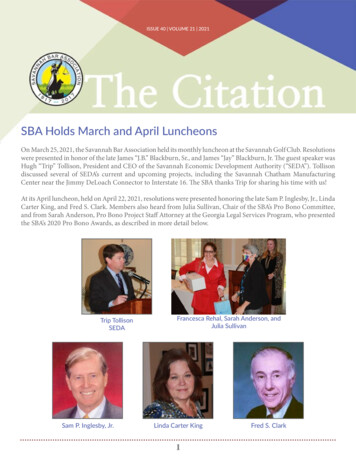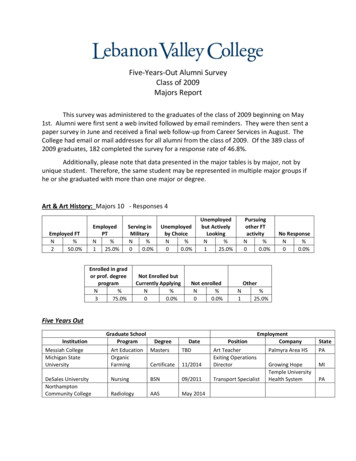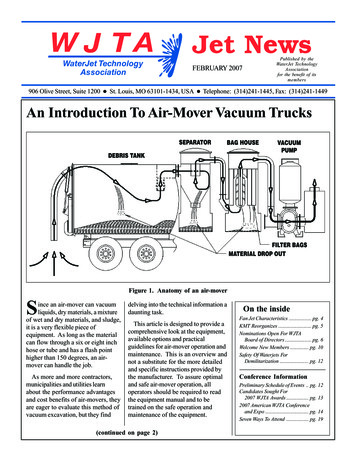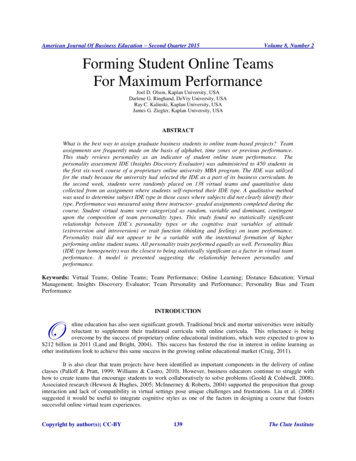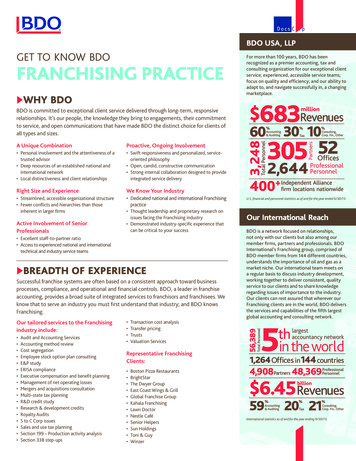
Transcription
BDO USA, LLPGET TO KNOW BDOFRANCHISING PRACTICEuWHY BDOFor more than 100 years, BDO has beenrecognized as a premier accounting, tax andconsulting organization for our exceptional clientservice; experienced, accessible service teams;focus on quality and efficiency; and our ability toadapt to, and navigate successfully in, a changingmarketplace.BDO is committed to exceptional client service delivered through long-term, responsiverelationships. It’s our people, the knowledge they bring to engagements, their commitmentto service, and open communications that have made BDO the distinct choice for clients ofall types and sizes.A Unique CombinationProactive, Ongoing Involvement Personal involvement and the attentiveness of atrusted advisor Deep resources of an established national andinternational network Local distinctiveness and client relationships Swift responsiveness and personalized, serviceoriented philosophy Open, candid, constructive communication Strong internal collaboration designed to provideintegrated service deliveryRight Size and ExperienceWe Know Your Industry Streamlined, accessible organizational structure Fewer conflicts and hierarchies than thoseinherent in larger firms Dedicated national and international FranchisingpracticeActive Involvement of SeniorProfessionals Thought leadership and proprietary research onissues facing the Franchising industry Demonstrated industry-specific experience thatcan be critical to your success Excellent staff-to-partner ratio Access to experienced national and internationaltechnical and industry service teamsuBREADTH OF EXPERIENCESuccessful franchise systems are often based on a consistent approach toward businessprocesses, compliance, and operational and financial controls. BDO, a leader in franchiseaccounting, provides a broad suite of integrated services to franchisors and franchisees. Weknow that to serve an industry you must first understand that industry; and BDO knowsFranchising.Our tailored services to the Franchisingindustry include: Audit and Accounting Services Accounting method review Cost segregation Employee stock option plan consulting E&P study ERISA compliance Executive compensation and benefit planning Management of net operating losses Mergers and acquisitions consultation Multi-state tax planning R&D credit study Research & development credits Royalty Audits S to C Corp issues Sales and use tax planning Section 199 – Production activity analysis Section 338 step-ups Transaction cost analysis Transfer pricing Trusts Valuation ServicesU.S. financial and personnel statistics as of and for the year ended 6/30/13.Our International ReachBDO is a network focused on relationships,not only with our clients but also among ourmember firms, partners and professionals. BDOInternational’s Franchising group, comprised ofBDO member firms from 144 different countries,understands the importance of oil and gas as amarket niche. Our international team meets ona regular basis to discuss industry development,working together to deliver consistent, qualityservice to our clients and to share knowledgeregarding issues of importance to the industry.Our clients can rest assured that wherever ourFranchising clients are in the world, BDO deliversthe services and capabilities of the fifth largestglobal accounting and consulting network.Representative FranchisingClients: Boston Pizza RestaurantsBrightStarThe Dwyer GroupEast Coast Wings & GrillGlobal Franchise GroupKahala FranchisingLawn DoctorNestle CaféSenior HelpersSun HoldingsToni & GuyWinzerInternational statistics as of and for the year ending 9/30/13.
uINDUSTRY THOUGHT LEADERSBDO has been a valued business advisor to franchisors and franchisees for more than 100years. BDO understands the complex nature of the franchising industry from both thefranchisor and franchisee perspective and has the right mix of firsthand experience tohelp you plan and implement organizational and financial strategies for future success.And, when you need guidance on complex matters like royalty audits, employee stockoptions or M&A activity, our professionals provide guidance through partner-led clientservice teams, direct access to technical leaders and the resources of our global networkin more than 100 countries.BDO’s Franchising practice places a strong emphasis on understanding industrytrends and their implications for franchisors, franchisees, retail and consumerproducts companies.2013www.bdo.ComWe publish a variety of knowledge resources, including:ContaCt:Al FerrArANew York212-885-8000 / aferrara@bdo.com B DO RiskFactor Report, an annual benchmarking andanalysis of the risk factors identified by major publicretail and consumer product businessesDAviD BerlinerNew York212-885-8347 / dberliner@bdo.com2013www.bdo.comSteve FerrArAChicago312-616-4683 / sferrara@bdo.comrAnDy FriScherNew York212-885-8445 / rfrischer@bdo.comRegulatoRy ConCeRnsPRolifeRate foR RetaileRsin 2013The BDO ReTail COmpass suRveyThe 2013 BDO RiskFactor Reportfor Retail Businesses examines the risk factorsOf CfOs is a national telephone surveyin the most recent 10-K filingsof thebylargest100 publiclyU.S. retailers; theconductedMarket Measurement,Inc.,tradedanindependent market research consulting firm,factors are analyzed and rankedby order of frequency cited.whose executive interviewers spoke directly BDO Retail Compass Surveys, periodic surveys ofC-level industry executives on timely topics affectingtheir business Consumer Business Compass Blog, a real-time lookat the top trends and business issues impacting theretail, consumer and franchising industries(https://blog.bdo.com)with chief financial officers. The survey wasconducted within a scientifically-developed,aretailers found that federal, state and localfter a shaky 2012 marked pureby bothrandom sample of the nation’s leadinghighs and lows for the industry,retailers. The retailersregulationsin the study havewere increased as a risk among thelargestretailers. Nearly all retailersretailers are keeping a carefuleyeamongtheonlargest innation’sthe country.The seventhannualsurvey was conductedin January(97 percent)cite ofregulations as a risk asthe factors that may undermine theirstability2013. atthey navigate real and potential changes toin 2013. A shifting regulatory landscapebusiness,such as increasing employeehome and abroad, combined withForrisingmorelaborinformationtheiron BDOUSA’s serviceofferingsto this industryvertical, costsplease and consumer spending.healthcarecosts and the growing risk of externalthreatscontactone of the regionalserviceThe riskwas leaderscited by the most retailers in theto IT systems and supply chains, ranksamongbelow:study’s seven-year history and was secondretailers’ top risks as they work to navigate anonly to general economic conditions (100industry in flux.contact: percent).Retailers are feeling particular pressure fromDaviD BeRlineR, New Yorka heightened regulatory climate. Ouranalysis / dberliner@bdo.comUnderlying this year’s growing concern over212-885-8347of the risk factors listed in the most recentthe regulatory environment is renewedal feRRaRa,New York10-K filings of the largest 100 publicU.S.attention on potential changes to taxes,RetaileRs Remain cautious,but GReen liGht omnichannelinvestmentstheRe is one woRd to descRibe Recenteconomic news: mixed.sales results and consumer confidenceare uneven following the expirationof the payroll tax holiday, higher gasprices and delays in tax refunds, and whilethe housing market continues to improve, thejobs picture has been slow to rebound. In thisenvironment, retail executives are naturallyapproaching the year with caution, but theyare also busy making investments in theircompany and others to meet growing demandfor an omnichannel experience.In January, we polled 100 retail chief financialofficers for our annual Retail CompassSurvey of CFOs, and we found that CFOs seea promising year for deal flow and capitalinvestment across channels. Amid lingeringDouglAS hArtSan Francisco415-490-3314 / dhart@bdo.comiSSy KottonLos Angeles310-557-0300 / ikotton@bdo.comteD vAughAnDallas214-665-0752 / tvaughan@bdo.com2013WWW.BDO.COM212-885-8000 / aferrara@bdo.com Read moresTeve feRRaRa, Chicago312-616-4683 / sferrara@bdo.comDOuglas haRT, San Francisco415-490-3314 / dhart@bdo.comissy KOTTOn, Los Angeles310-557-0300 / ikotton@bdo.comalan selliTTi, New York212-885-8599 / asellitti@bdo.comTeD vaughan, Dallas214-665-0752 / tvaughan@bdo.comWhile concerns over consumer confidenceare likely driving these more conservativeprojections, the increase comes on top of2012’s strong 4.2 percent growth. Moreover,only seven percent of CFOs say they expecttheir total sales to decrease this year, a signthat retailers see the industry stabilizing.SANTA MAY BE TIGHTENING HIS BELT THIS HOLIDAY SEASON.In this environment, our eighth annual RetailCompass Survey of CMOs polled 100 chiefmarketing officers at leading retailers to gaugetheir sentiments on holiday sales, promotionsand strategies to tempt consumers in acrowded and fiercely competitive market.We found that retailers have temperedholiday sales projections following cheerierexpectations in 2012, which proved overlyoptimistic. And with consumer spending levelsa little more tenuous, retailers again planneda full promotional blitz, aiming to reachWhen it comes to feeding Millennials,franchises face steep competition oncampus bit.ly/1eBEJC1CONTACT: Read moreATHE BDO RETAIL COMPASS SURVEY OFCMOs is a national telephone survey conductedby Market Measurement, Inc., an independentmarket research consulting firm, whose executiveinterviewers spoke directly with chief marketingofficers. The survey was conducted within ascientifically-developed, pure random sampleof the nation’s leading retailers. The retailers inthe study were among the largest in the country,including 11 of the top 100 based on annual salesrevenue. The eighth annual survey was conductedin September and October of 2013.BDO Consumer@BDOConsumerFor more information on BDO USA’s serviceofferings to this industry, please contact one ofthe following regional practice leaders:RETAILERS BRACE FOR SHORT,FIERCELY COMPETITIVE HOLIDAYSEASONmid ongoing Federal budgetaryconcerns, underwhelming fall salesand slow economic growth, consumerconfidence is shaky at best, leaving retailerswith questions about how they will fare duringthe crucial fourth quarter.Keep up with industry hottopics by following us onTwitter @BDOConsumerAlAn SellittiNew York212-885-8599 / asellitti@bdo.comRanDy fRisCheR, New York212-885-8445 / rfrischer@bdo.comquestions about the state of the consumer,CFOs project a 3.2 percent increase in totalstore sales, down from last year’s expected 4.5percent increase, but in line with projectionsreleased by the National Retail Federation.Similarly, they anticipate a 2.3 percentincrease in comparable store sales this year,down from last year’s projected 4.1 percentgrowth.Want to hearwhat’s going onin the FranchisingIndustry?DAVID BERLINER, New York212-885-8347 / dberliner@bdo.comPAUL BROCATO, Chicago312-616-4639 / pbrocato@bdo.comAL FERRARA, New York212-885-8000 / aferrara@bdo.comRANDY FRISCHER, New York212-885-8445 / rfrischer@bdo.comshoppers across channels and capture salesthroughout the season.DOUGLAS HART, San Francisco415-490-3314 / dhart@bdo.com REALISTIC SALESNATALIE KOTLYAR, New York212-885-8035 / nkotlyar@bdo.comPROJECTIONSLooking at holiday comparable store sales,CMOs forecast a modest 2.5 percent increase,down from a 3.7 percent projection in 2012.Retailers also have slightly lower expectationsfor total sales. Overall, CMOs forecast a 3.8percent increase in total holiday store sales,down from an expected 4.7 percent increasein 2012. The 2013 projection is consistent withthe National Retail Federation’s forecast of a3.9 percent increase in holiday sales. Whileexpectations may be muted, it’s still goodnews that a majority of CMOs (58 percent)expect sales to increase this year, while just sixpercent forecast a sales decrease.ISSY KOTTON, Los Angeles310-557-0300 / ikotton@bdo.comALAN SELLITTI, New York212-885-8599 / asellitti@bdo.comTED VAUGHAN, Dallas214-665-0752 / tvaughan@bdo.com Read moreBDO Consumer@BDOConsumerFranchises need to keep up with the new,quickly-moving consumer bit.ly/1al9itsuCONTACT USOur Franchising practice consists of an experienced network of professionals who possessthe business and technical knowledge to deliver a variety of quality services to franchisorsand franchisees. Plus, our excellent staff-to-partner ratio affords our clients continuousaccess to experienced service teams.Jay Duke, DallasFranchising Practice Leader214-665-0607 / jduke@bdo.comAlan Stevens, DallasAssurance Partner, Franchising Practice214-665-0786 / astevens@bdo.comKaren Stone, NashvilleTax Partner, Franchising Practice615-493-5630 / kstone@bdo.comMarcy Wright, DallasMarketing Director, Franchising Practice214-259-1417 / mwright@bdo.comBDO is the brand name for BDO USA, LLP, a U.S. professional services firm providing assurance, tax, financial advisory and consulting services to a widerange of publicly traded and privately held companies. For more than 100 years, BDO has provided quality service through the active involvement ofexperienced and committed professionals. The firm serves clients through 49 offices and over 400 independent alliance firm locations nationwide. As anindependent Member Firm of BDO International Limited, BDO serves multinational clients through a global network of 1,264 offices in 144 countries.BDO USA, LLP, a Delaware limited liability partnership, is the U.S. member of BDO International Limited, a UK company limited by guarantee, and formspart of the international BDO network of independent member firms. BDO is the brand name for the BDO network and for each of the BDO MemberFirms. For more information, please visit www.bdo.com.www.bdo.comwww.bdo-international.com 2014 BDO USA, LLP. All rights reserved.People who know Franchising, know BDO.BDO Consumer@BDOConsumerNew report finds franchise establishmentswill post biggest growth since theRecession bit.ly/1eQlEN8Go to www.bdo.com/retailto learn more.
Kate O'Neill, founder and CEO of KO Insights, is aspeaker, author, and consultant focused on topics at theintersection of data, humanity, and meaningfulexperiences. Kate’s prior experience includes foundingdigital strategy and analytics firm [meta]marketer,creating the first content management role at Netflix,leading cutting-edge online optimization work atMagazines.com, developing Toshiba America’s firstintranet, building the first website at the University ofIllinois at Chicago, and holding leadership positions in a variety of digital contentand technology start-ups.Kate has been featured in CNN Money, TIME, Forbes, USA Today, and other nationalmedia. She writes a business column for The Tennessean, contributes regularly to avariety of online outlets including CMO.com, and is the author of an upcoming bookon meaningfulness in marketing. Kate is a vocal and visible advocate for women intechnology, entrepreneurship, and leadership — she was featured by Google in theirglobal campaign for women in entrepreneurship — as well as for Nashville as agrowing tech center.For more information, go to www.koinsights.com
FRANCHISOR TOOLKITFranchisors face a blizzard of paperwork in offering, selling and documenting a franchise. Mitigated Risks'Franchisor Toolkit automates the key functions in compliance, communication and contract processing, givingyou an easy way to track your transaction, create documents that meet compliance standards, and to assure thatyour records will comply with regulatory requirements while they meet your business needs. That way, yourmanagement team can be confident in your administrative process so you can focus on meeting the demands ofexpanding and managing your franchise system.Mitigated Risks LLC is a wholly-owned subsidiary of the Baker Donelson law firm offering training andcompliance services and support. The web-based Franchisor Toolkit was developed to leverage Baker Donelson'sextensive experience working with franchisors. It gives you an easy-to-use, cost-efficient way to automate yourdocument production and record-keeping as well as organize and store all the documents related to each franchisetransaction as they are created. The system links all related files in an easy-to-access and shareable environment.No matter where your team members reside or work, your key documents are available in a virtual world, forinstant review in a password-controlled access system, from any computer with internet access.The Franchisor Tool Kit requires no investment in hardware or software, resides on our secure servers, encryptsdocuments in transit, is customized for your work flow, shares files with your CRM and other applicationsseamlessly, and enhances productivity through automation, division of labor and reduced data reentry.Acting as your "virtual" franchise administration resource, the Franchisor Toolkit will help you:Track and maintain state filing disclosure documents and Item 23 receiptsAccess real-time updates on registration status and maps of go/no go statesCreate, store, track and quickly retrieve transaction documents and franchise formsAvoid missing important compliance deadlines (through email reminders)Reduce the cost of document assembly and production in the event of litigation or saleAvoid the surprise of a forgotten document that affects the outcome of a dispute or a decisionWhether you are an established, large-scale franchisor, a mid-sized brand hitting a growth spurt, or a start-upconcern, our Franchisor Toolkit is scalable to meet your unique needs and can free up management, IT and legalteams from administrative drudgery. Multi-system franchisors and owners can standardize the process, so allsystems use the same platform.If you’re interested in learning more about how the Franchisor Toolkit can simplify your compliance world,contact Joel Buckberg for a demonstration.Joel .mitigatedrisks.comMitigated Risks LLC is a wholly-owned subsidiary of Baker Donelson providing compliance resourcesand advanced online training products to companies of all sizes.
NLRB JOINT EMPLOYER STATUSIn July, the National Labor Relations Board (NLRB) Division of Adviceannounced that a franchisor could be designated as a joint employerof its franchisees employees. IFA is fighting this dangerous assertionbecause it is unlawful and will harm job growth, the economy andlocally-owned franchise small businesses in every state.Franchisees have been an important driver of the economic recoverysince the Great Recession, growing faster than non-franchisebusinesses during this period. More than 770,000 franchise businessesoperate in over 100 different business categories such as restaurants,hotels, business services, retail stores, real estate agencies andautomotive centers. Franchise businesses employ more than 8 millionworkers and contribute roughly 494 billion to the U.S. Gross DomesticProduct, or 3.1% of total private sector GDP.The Service Employees International Union (SEIU) is leading organizedattacks against franchising. This well-financed, national campaignagainst franchising by SEIU is a desperate, special-interest ploy toreplenish the union’s dwindling coffers and membership. The laborunions multi-pronged attack at the local, state and national levelsinclude having the federal government declare entire franchisesystems as a single unit rather than the collection of separate, smallbusiness owners they actually are. The SEIU wants to undermine thefranchise business model so it can more easily unionize entire franchisesystems, as it is much more difficult for unions to organize thousandsof independent small businesses under the current regulatory system.
Key Points: The NLRB Division of Advice ignored decades of regulatory,legal and legislative precedent that make it clear franchisees areseparate businesses from their franchisors. Their legally bindingcontracts also make this clear.A franchise is an agreement or license between two independentbusinesses. Many franchise businesses with familiar brand namesare actually locally-owned and operated small businesses thatpay an initial fee and ongoing royalties to use the trademarks ofthe franchisor.Franchisors are responsible for brand standards and quality,while franchisees are responsible for day-to-day operations andemployment decisions that include hiring, firing, wages andbenefits, and working conditions.Franchisees have invested their capital in the business and standto lose equity in their businesses if their franchisors are deemedjoint employers.Disputes over liability will only produce costly litigation for boththe franchisee and franchisor.THE ASK: “Will you sign a letter to the NLRB’s GeneralCounsel, asking for the rationale and the relevant factsconsidered to make the determination that McDonald’s can bea joint employer with its franchisees?”
The NLRB General Counsel’s Proposed Changein the “Joint Employer” Standard:What It Means for the Franchise IndustryBEFOREAFTEROld (Current) Joint Employer StandardNew (Proposed) Joint Employer Standard Franchise businesses are joint employersonly when they share “direct andimmediate” control over matters governingthe essential terms and conditions ofemployment.Focus is on terms and conditions ofemployment including hiring, firing,discipline, supervision and direction. Factors indicating direct control (currently): Detailed control of employees’ dailyactivities by franchisor’s supervisorsFranchisor authority to discipline anddischarge franchisee’s employeesFranchisor hiring or rejection of certainfranchisee employeesFranchisor making labor relations decisionsfor both companiesFee arrangements that are tied primarily tolabor costsFranchise businesses would be joint employerswhenever the franchisor exercises “indirectcontrol” over the franchisee. This broadprovision could make virtually all franchisorsand franchisees joint employers.Focus would be on “industrial realities” thatmake the franchisor a necessary party tomeaningful collective bargainingJoint employer status may be found eventhough the franchisor plays no role in hiring,firing, or directing the franchisee’s employees.Factors indicating indirect control(according to NLRB’s GC): Franchisor monitors operational procedures offranchisee employeesFranchisee employees wear franchisoruniformsFranchisee employees follow franchisorreporting and documentation requirementsFranchisor conducts training of franchiseeemployeesServices provided under Franchise agreementare franchisee’s sole businessFranchisor meets with franchisee suppliersEmployees and supervisors transfer betweenfranchisor’s and franchisee’s locationsFranchisor sets price of goods soldFranchisor sets speed and frequency offranchisee employee tasksFranchisor determines equipment franchiseeemployees use and how
FAQ’s: WHY IT MATTERS AND WHAT TO DO NOWIf the NLRB General Counsel succeeds in changing the joint employer standard, how willthat affect traditional franchise businesses? When joint employer status is established, both entities may be liable for the other’sunfair labor practices, including unlawful discipline or discharge of employees underthe National Labor Relations Act. A new joint employer standard may make it easier for unions to organize multiplefranchisees of a single franchisor. A new joint employer standard will increase the likelihood of union “corporatecampaign” tactics against national franchisors, in order to pressure franchisees. A new joint employer rule could impose new bargaining obligations on franchisorsand could also give unions the right to strike or picket at any franchise systemlocation, not just the location where a dispute arises. Faced with potential liability for their franchisees’ employment decisions, franchisorsmay be forced to exercise operational control over all the employment and humanresource decisions of franchisees, undermining the franchise business model.WHAT SHOULD FRANCHISORS AND FRANCHISEES DONOW?Right now, the old joint employer standard continues to bethe law. It is up to the five members of the NLRB itself tomake any official change. But the General Counsel’s decisionto issue a complaint against one of the country’s leadingfranchisors should serve as a “wake up call” for all franchise businesses. At a minimum,franchise businesses should monitor this situation closely through organizations like theIFA. Here are some other suggested action items: Audit franchise practices to minimize factors showing “indirect control” overemployee working conditions in the franchisor/franchisee relationship, wherepossible. Review franchise agreements to be sure they expressly give franchisees control overtheir employees’ terms and conditions of employment. Limit exposure of franchisee employees to franchisor representatives. Franchisormanagers should primarily interact only with the franchisee’s managers. Monitor NLRB rulings for the latest directives provided by the agency. Speak out! Through the International Franchise Association’s Franchise ActionNetwork program to help make the case against changing the joint employerstandard at the NLRB and in Congress.For more information, visit www.FranchiseActionNetwork.com.
Timeline of Joint Employer announcement: David Weil issues Fissured Industries announcing the attack on the model. Weilappointed as DOL Wage & Hour Chief in 2014 on party-line vote in Senate. In 2013, multiple Unfair Labor Practice charges (ULPs) are filed against MCD andfranchisees in New York and Chicago and elsewhere alleging joint employment. In November 2013, regions investigate the claims and send to Division of Advice as tohow to proceed. On April 30, 2014, the NLRB invited amicus briefs on whether the Board should adopt anew joint-employer standard in Browning-Ferris Industries. The case addresses whetherBrowning-Ferris (a non-franchise waste management company) should be considered ajoint employer with Leadpoint, a staffing services company, in a union representationelection. The Board’s current standard deems businesses joint employers only whenthey share direct and immediate control over essential terms and conditions ofemployment including hiring, firing, discipline, supervision and direction.oOn June 26th, Richard Griffin, NLRB General Counsel, filed his amicus brief in theBrowning Ferris case, which may well illuminate the underlying rationale behindthe complaints issued against McDonald’s naming them as joint employers.There, the General Counsel asserts that the Board should abandon its “narrow”joint-employer standard and “return” to the broader “traditional” approach. Mr.Griffin believes companies may effectively control wages by controlling othervariables in the business. He moves the analysis away from day-to-day controlover employment conditions to operational control at the system-wide level. Hewould find joint employment based on direct control, indirect control, potentialcontrol and when “industrial realities” make the company a necessary party tomeaningful collective bargaining.oIn response to Griffin’s amicus, IFA submitted an amicus brief, arguing againstapplying the broader indirect control and industrial realities test to franchisecompanies due to the negative economic consequences this would have onsmall business franchisees. July 29 – NLRB General Counsel announced it was issuing complaintsagainst McDonald’s franchisees and their franchisor, McDonald’s, USA, LLC, allegingthat they violated the rights of employees. The General Counsel announced that 181cases had been filed since November 2012. 68 cases were found to have no merit, 64cases were still pending investigation, and 43 cases were found to have merit and acomplaint was authorized. Between July 29 and Dec. 19 - Additional charges were filed, bringing the total numberof cases to 291 since November 2012. Dec. 19 – The General Counsel issued formal complaints against McDonald’sfranchisees and their franchisor, McDonald’s USA, LLC, as joint employers. Of the 291charges filed since November 2012, 86 cases have been found meritorious andcomplaints will issue on those cases. 11 cases were resolved and 71 cases remain
under investigation. Given these numbers, it appears that 123 cases have been dismissed, but the Board didnot announce the total number. (86 complaints were authorized, 11 cases “resolved” orsettled, and 71 are currently under investigation – 291 – 168 123).Next Steps regarding McDonald’s complaints: So far, the General Counsel issued 13 complaints involving 78 charges. Morecomplaints will issue. The NLRB consolidated hearings in three Regional locations inthe Northeast, Midwest and West. The initial litigation will begin on March 30, 2015 in Manhattan. Subsequent hearings willbe held in Chicago and Los Angeles. The Board has not scheduled many of thehearings, perhaps because it hopes that litigation will not be necessary after litigation inthe initial cases. After the initial litigation in front of the Administrative Law Judge (ALJ), the parties will filebriefs and the ALJ will issue a proposed decision. That decision may be appealed to the NLRB in Washington D.C. During the appeal, interest parties may file a motion to file Amicus briefs. The Board’s decision is subject to appeal to federal district court where the unfair laborpractice occurred, or in the District of Columbia. Interested parties may again request to file Amicus briefs at this stage. Ultimately, thecase may be appealed to the U.S. Supreme Court. The Board may enforce its decisionduring the appeal process or may choose to stay its decision on appeal or the appealscourt may issue a stay, if requested. This process will take years.
Franchising clients are in the world, BDO delivers the services and capabilities of the fifth largest global accounting and consulting network. International statistics as of and for the year ending 9/30/13. U.S. financial and p



